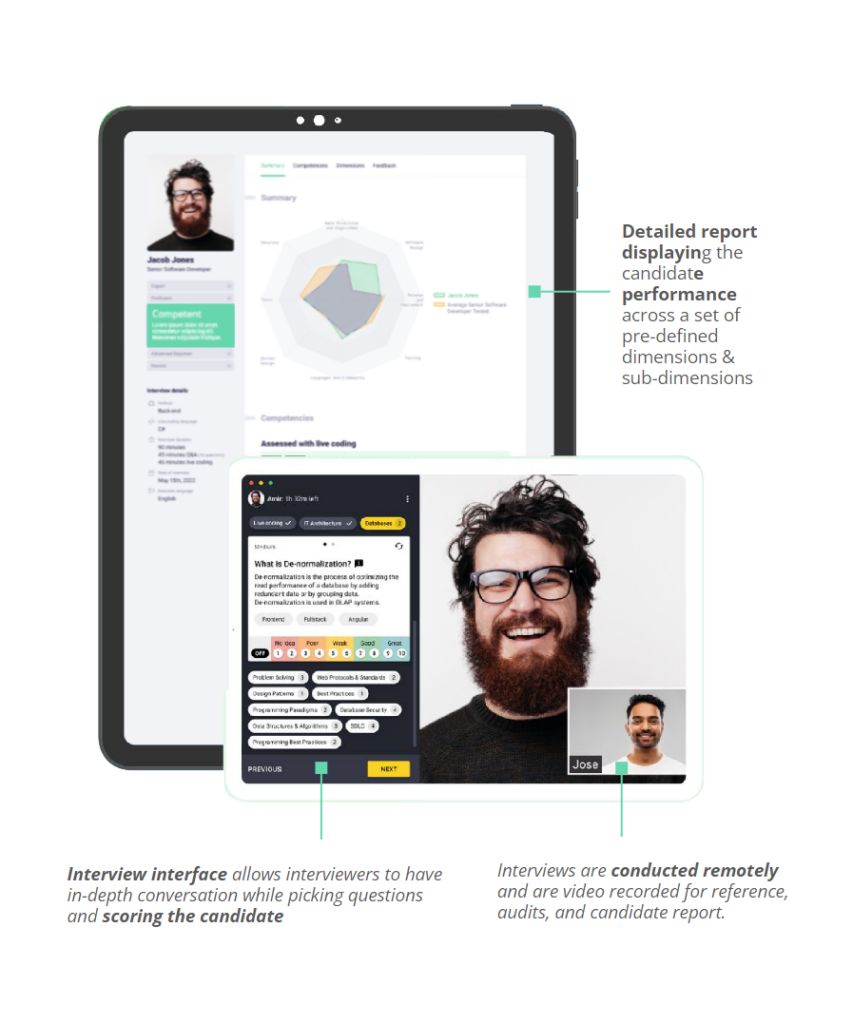Technical interviews can be a nerve-wracking experience, especially when you’re vying for your dream job. The high stakes involved often amplify the pressure. However, with proper preparation and a confident mindset, you can navigate these interviews successfully. In this blog, we delve into the diverse types and stages of technical interviews, equipping you with valuable tips and strategies to excel and increase your chances of securing your desired tech role.
WHAT IS A TECHNICAL INTERVIEW?
Unlike traditional interviews, technical interviews delve deep into your technical expertise and problem-solving abilities, aiming to evaluate your potential to thrive in a tech-driven environment. Similar to the adage “Actions speak louder than words,” a technical interview requires candidates to substantiate their skills rather than simply professing them to the interviewer.
The recruiting process varies across companies, and this is true for technical interviews as well. Companies employ different types of technical interviews at various stages in the recruitment process. They are designed to evaluate a candidate’s soft and technical skills, as well as their suitability for the role. From phone or video screenings to home coding assignments, live coding exercises, and whiteboard challenges, there are numerous avenues through which your skills can be assessed.
PHONE OR VIDEO SCREENING
The initial stage of the technical interview process often involves a phone or video screening, where recruiters or hiring managers assess the candidate’s qualifications and fit. Congratulations! Reaching this stage indicates the company’s interest in exploring your potential further based on your resume.
This interview stage typically lasts 15-30 minutes. Beyond purely technical skills, which are already outlined in your resume, interviewers on a phone screen are interested in assessing your passion for technology and coding, your alignment with the company culture and values, and your overall enthusiasm for the role. To prepare for a technical phone or video interview, consider the following tips:
Tailor your communication based on the interviewer’s background. If you’re speaking with a recruiter who may have limited programming knowledge, focus on highlighting your soft skills. On the other hand, when interviewing with a person with technical experience, feel confident in showcasing your technical expertise and discussing specific technical details.
One valuable tip for preparing for a job interview is to research your interviewers beforehand, which can be done by looking them up on LinkedIn. This practice not only helps alleviate interview anxiety by putting a face to a name but also provides an opportunity to discover potential commonalities, such as attending the same university or sharing similar interests, that can help break the ice during the interview.
Express your excitement for the company or the project you’re discussing during the interview. Demonstrating passion and genuine interest in the work can leave a lasting impression on the interviewer and show that you are motivated to contribute.
For example, if you’re applying for a role in automotive driving, you can show your enthusiasm by demonstrating your awareness of the company’s progress and recent achievements, mentioning the recent collaboration between Bosch and CARIAD.
Share your authentic interests in the job and the specific project types that excite you. Being honest about your preferences helps ensure that you’re aligned with the role and the work you’ll be doing, increasing the likelihood of a successful match between you and the company.
For instance, communicate your preferred way of working and collaborating: “I like that the job requires cross-functional collaboration as I really enjoy uncovering synergies between teams.”
When addressing behavioral questions, it’s crucial to draw from your previous experiences and use specific examples to illustrate your skills effectively. Focus on providing tangible details and outcomes that paint a clear picture of your capabilities.
For example, when discussing managing a challenging project with tight deadlines, highlight measurable outcomes like increased system performance, improved user experience, or cost savings, to demonstrate the positive impact of your efforts.
Customize your responses to align with the specific job you’re applying for by researching the company’s values, mission, job requirements, recent company news, etc. Incorporate relevant information into your responses to show that you understand the company’s needs and are genuinely interested in contributing to its success
Our Talent Acquisition Manager, Raghda, has shared insight on common mistakes made by tech talents during the initial stage of interviews:

TAKE-HOME CODING ASSIGNMENT
Take-home coding assignments have become a popular method for companies to assess candidates’ coding skills before an in-person interview. As a candidate, this is your opportunity to demonstrate your skills and abilities within a specified time limit, typically around 48 hours. In the following sections, we have compiled a set of tips to help you approach these assignments.
Before diving into the assignment, take the time to fully understand the requirements. Avoid making assumptions and seek clarification by asking questions. Some companies intentionally keep their requirements vague to test your problem-solving approach. Embrace this challenge and demonstrate your engagement and genuine interest by seeking additional information.
Prioritize completing the core requirements of the coding challenge over adding excessive features. Utilize your existing knowledge and skills to provide a solid foundation for your solution, demonstrating your ability to effectively solve problems within given constraints.
Break down the coding challenge into smaller tasks and assign timeframes. Begin with a basic readme and open a pull request. As you code, commit logically and frequently to track progress and allow for easy revisions. Keep pull requests small and review your own work. This systematic approach tells a clear story of your solution and helps you outperform competitors.
Define various scenarios and edge cases that need to be covered by your tests. As you implement each feature or component, write corresponding tests to verify functionality and catch any bugs or issues early on. This demonstrates your commitment to producing a dependable and bug-free solution.
Once the functionality is in place, shift your focus to enhancing the readability and maintainability of your code. Clean, well-structured code is a sign of professionalism and care. Employ best practices, follow coding standards, and document your code to make it easier for others to understand.
Before submitting the assignment, conduct a thorough code review. Ensure your code meets all the requirements. Run comprehensive tests to catch any potential issues. Additionally, carefully follow any additional instructions provided by the company. Attention to detail and a polished final submission will leave a lasting impression.
WHITEBOARD CHALLENGE
Whiteboard challenges are a common component of onsite technical interviews, usually conducted in the later stages of the hiring process. They provide employers with insights into a candidate’s problem-solving abilities and critical thinking skills in real time. These challenges typically take place on a whiteboard or a shared coding environment, allowing you to collaborate directly with the interviewer. Here are some tips to help you navigate onsite whiteboard challenges:
Before diving into the code, take the time to ask clarifying questions. Same as during the take-home assignment, this not only ensures that you fully understand the challenge but also demonstrates your thoughtful approach. By seeking hints and gaining a comprehensive understanding of the problem, you can better formulate an effective solution.
Engage in a verbal dialogue with the interviewer as you work through the problem. Articulate your thoughts, explain your reasoning, and discuss potential solutions. This allows the interviewer to gain insight into your problem-solving process and communication skills, showcasing your ability to collaborate effectively.
Speak clearly and precisely, avoiding ambiguity or vague terminology. Use formal names and specific vocabulary to describe concepts and actions. This clarity of thought and language not only helps you stay focused but also demonstrates your ability to convey complex ideas effectively.
If you encounter challenges or get stuck, remain calm and think out loud. Start with what you know and attempt different approaches or ideas. Remember, the interviewer is interested in your problem-solving approach and thought process. Show your willingness to try, experiment, and adapt as you work towards a solution.
Toward the end of the whiteboard challenge, thoroughly check your code for errors. Demonstrate your commitment to writing bug-free code by reviewing your solution. Once done, take the opportunity to walk through your solution, explaining your approach and highlighting key decisions.
LIVE CODING ASSESSMENT
At Futurepath, we understand the importance of accurately assessing the coding skills of tech talents. That’s why we offer Peer-to-Peer technical assessments as part of our comprehensive evaluation process. These assessments provide candidates with the opportunity to collaborate with another developer in a virtual environment, allowing them to demonstrate their coding abilities in real-time. By leveraging this innovative approach, we ensure that our clients have a thorough understanding of the candidates’ technical capabilities.
Here are some tips to help you prepare and excel in Peer-to-Peer technical interviews:

Regularly engage in online coding challenges and coding questions to sharpen your skills. Collaborate with a friend or acquaintance to simulate mock interviews. This allows you to practice discussing programming problems and explaining your approach to solving them, similar to the real interview situation.
If anything is unclear, don’t hesitate to ask for clarification. For example, understanding whether you can use external sources is crucial for showcasing your skills and ensuring a successful interview. By seeking clarification, you demonstrate professionalism, avoid misunderstandings, and align your approach with the interviewer’s expectations.
Don’t rely on mentioning keywords without a deeper understanding. It’s better to acknowledge when you’re out of your depth and explain how you would approach researching a topic. Demonstrating a willingness to learn and adapt is more valuable than giving a misleading or incomplete answer.
Write clean, concise, and readable code during the live coding challenge. Ensure your code can be easily executed and tested. Additionally, clearly communicate the thought process behind your coding decisions, showcasing your logical and reasoned approach.
We are confident that these tips and strategies will greatly benefit you in navigating your technical interviews. However, we understand that each interview is unique and may require individualized guidance. By partnering with Futurepath and our dedicated team of recruiters, you gain access to personalized support and tailored advice, specifically designed to enhance your interview performance.



